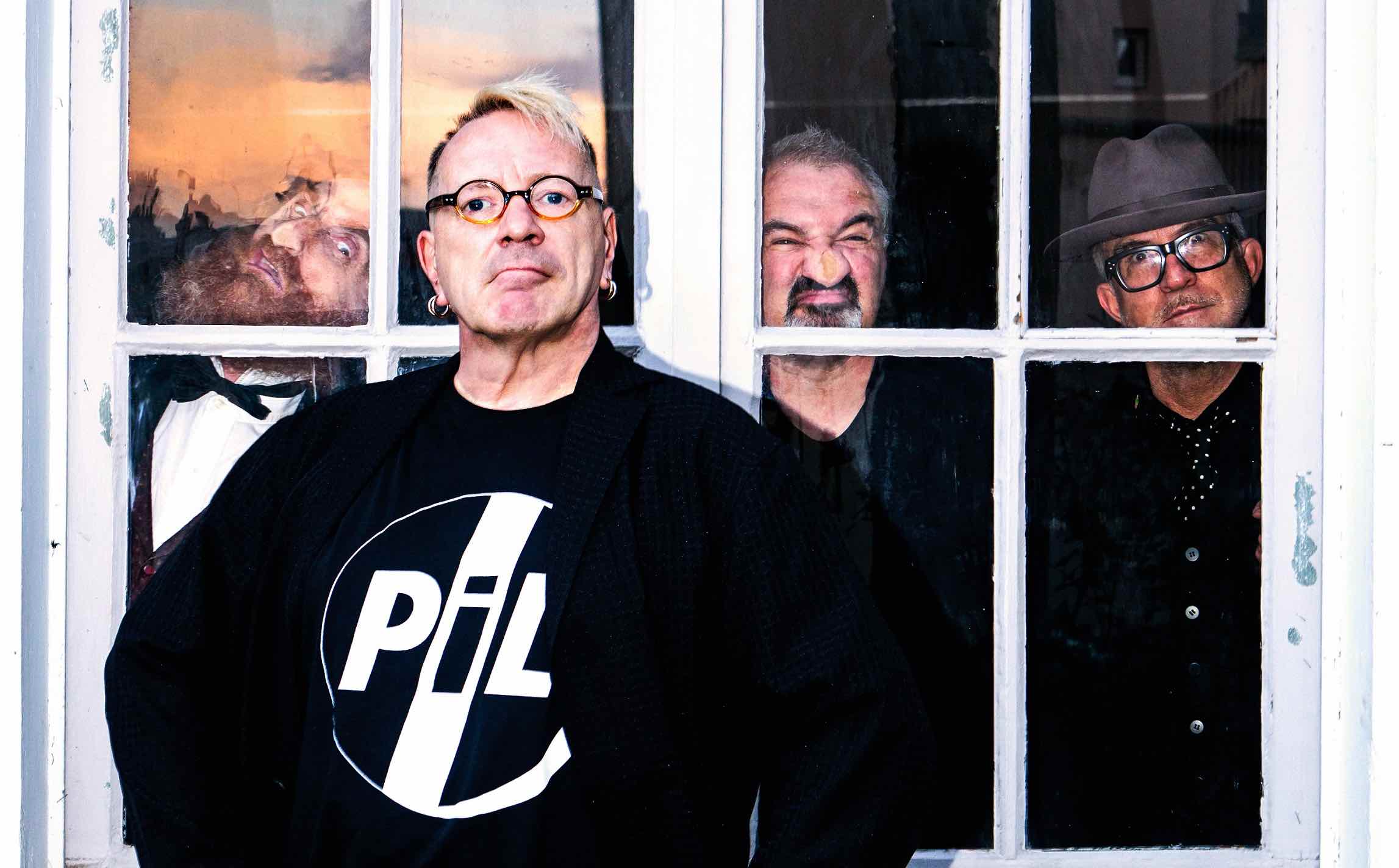If anyone has the credible world-weariness with which to criticize a doomed planet in the present day, it’s John Lydon. On End of World, his 11th album with Public Image Ltd, Lydon’s euphoric, dance-driven, sketchy, surround-sound environment—co-created with Scott Firth, Lu Edmonds, and ex-Slits/Pop Group drummer Bruce Smith—cattily captures the frontman tackling silly social media millennialism (“Being Stupid Again”), false, witless friends (“L F C F”), and the literal and figurative divisiveness that makes the 21st century turn (“Walls”).
You could write all this off to Lydon’s legendary contrarian snark if it wasn’t for the fact that his so-called conservative streak may have become more common-sensical than Trumpian, and that his many operatic, abstract voices on End of World convey surprisingly moving emotions beyond cutting social or personal criticism. The tenderness of album closer “Hawaii” and its farewell to his wife of 44 years (Nora Forster, lost to struggles with Alzheimer’s back in April) would tear your heart out if it wasn’t for its sweet, strange island allure. As PiL’s death disco rambles behind him in the mix, Lydon turns End of World into a hypothetical, philosophical treatise on all that we may miss when our Earth disappears.
In conversation from his home in Malibu, on the day of his friend and Sex Pistol graphic artist Jamie Reid’s death, Lydon takes no prisoners—and is all the more entertaining for it. After having interviewed him at least a dozen times since PiL’s start (to say nothing of him having snagged my pack of Marlboros at Studio 54 back in the day—but that’s another story), Lydon isn’t about to let this interview be at all precious. “You’re very pompous, aren’t you,” he says, laughing. For the first several minutes of our chat, I’m being little more than pretentious—until I’m not. “You’re all right,” Lydon says. “But I really believe you’ve overthunk the whole thing.”
The music for so much of End of World is rich and celebratory, while so much of its subject matter is not—not a new thing for PiL, considering that “Death Disco” focused on the then-recent death of your mother.
It’s 13 songs, they all deal with very varied subjects to the best of our ability. This is how we view the world. If you choose to analyze it or tear it apart with any degree of intellectual idiocy, you’re doing it wrong, merely entertaining yourself. Which is our desired result: entertainment.
“This is how we view the world. If you choose to analyze it with any degree of intellectual idiocy, you’re doing it wrong, merely entertaining yourself. Which is our desired result: entertainment.”
Would you say you worked on the tracks’ lyrics any differently than you have in the past?
I did, as I have always done during my entire showbiz career. I write songs to the best of my ability and as accurately as I can, and each and every scenario that I create—in our minds—is to the best possible effect. “Car Chase,” for example, is about the son of a friend of mine who was put into an old folks home in Britain because he couldn’t take care of himself. Which, in reality, he could. But they stole his independence. So what he did at night was break out, steal cars, rob supermarkets, then return in the morning to deliver the fabulous line, “It wasn’t me.” I applaud his search for freedom, and the fact that he viewed an old folks home as one would a prison or a mental institution. He had to escape to find himself.
“Being Stupid” feels as if you’re making fun of the memes that currently guide millennial thinking.
Now you’re just being stupid. There’s humor across the entire album. Humor is the most accurate way to display human emotions. Steadfast intellectualism achieves nothing. My Irish roots dictate that. We cry at weddings and laugh during funerals. This is an important juxtaposition of events in my life. Keeps you from thinking mainstream.

“I’ve put more hair dye on my head to poison an entire nation, and still my hair is thicker than it should ever hope to be.”
“Walls” is certainly funny, despite the rhetoric of boundaries.
Sometimes we need separation from each other. We can call it space—we can call it a front door or a garden gate. But they’re ours and no one has the right to interrupt that. You could, of course, take the concept of walls to a larger issue. Always, though—as with all problems in life—begin at home: If you’re so freedom-loving, why do you have a front door? Correct your closest facilities, then look outward. Plain and simple: What’s mine is mine, what’s yours is yours, and if I interfere in yours, in any way, I have no rights. You have every right to defend that. There’s a political situation involving walls right now, and the end result is abhorrent chaos. That’s as far as I’ll go on any political points.
You split your time between Malibu and London, both of which are a mess. The last time we spoke, you spoke from a conservative bent…
See, but I think my viewpoint is just common sense. It took me years to get American citizenship. I don’t mind the vetoing process. I think it’s fair and reasonable, as in: if this is my house, I would like to know who walks through my front door before I let them in. It’s only common sense to question who the stranger is in your living room. Otherwise, it’s chaos and you’re opening yourself up to any manner of unspeakable crimes. I can’t get involved in political stakes because my viewpoint on politicians—past and present—is that they’re a bunch of fuckheads. Career monsters, all of them, no matter what party.
Are you surprised we’ve wound up at this point in society?
Not really. The misinformation coming out of places of higher learning is appalling. It’s lost the plot, and has done so for centuries. I used to have arguments like this with Jamie Reid, who just passed—he being a staunch Marxist. What they were asking for was utterly stupid. It’s nice preaching, a Marxist point of view, but he didn’t mind cashing those checks for the art work. Very contradictory. There’s the flaw. Before that, in my day, there were the hippies—“Hey man, ban the bomb!”—and the age of “free love.” Problem was, those same wannabes wound up setting up the record labels such as Virgin Records. Eh?! It’s all very corrupt and deceitful.
“Humor is the most accurate way to display human emotions. Steadfast intellectualism achieves nothing.”
“All journeys end / Some begin again” is the most poignant verse from “Hawaii.” Do you believe in an afterlife?
I think that would be the hope of any sane person, because when you’re facing tragic loss, it’s hard to reconcile within yourself. Who knows what dreams may come, to quote Shakespeare. There’s a refrain in that song that I know Nora would understand as we were so very close— “aloha,” which means “hello” and “goodbye” in Hawaiian. To have that happen in one word is a magnificent concept. If there’s any possibility at all of ever meeting her again, I would accept it. Now, you could wrap that concept up in religion and I would tell you straight away that you were wrong. Religion is a man-made concept.
Nora’s passing aside, where do you stand on your own mortality?
The same place that I’ve always been when I’ve lost anyone that I’ve known around me, including my mother and father. I have two brothers who are both suffering from cancer at the moment, and I have friends who are dying around me, left, right, and center. It’s not a great vibe. It’s the hardest thing for me to accept, death is. I don’t know what happens. I don’t know where they go. I’m forever hopeful that it’s somewhere.
As for me, I’ve not taken care of my health for…well, since the day I was born, really. Yet I’m still here. I’ve put more hair dye on my head to poison an entire nation, and still my hair is thicker than it should ever hope to be. I don’t know what the juxtaposition is in life, but you take the cards that you’ve been given and play those hands to the best of your ability. FL







